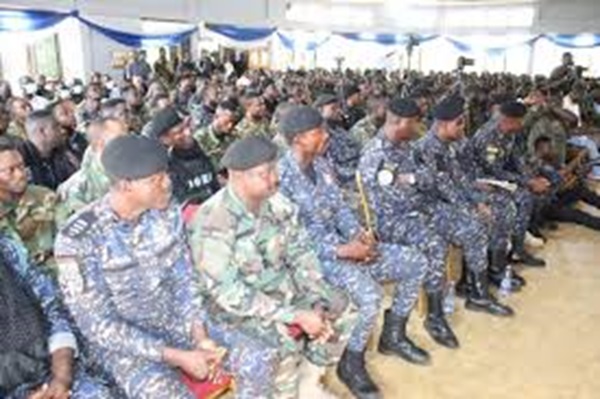State of Emergency or Security Zone: Ghana’s galamsey fight and the sanctimonious security apparatus

Ghana’s perennial battle against illegal mining, popularly known as galamsey, has entered another turbulent chapter.

The Minister for Lands and Natural Resources, who also doubles as the acting Minister for Environment, Science and Technology, Emmanuel Armah-Kofi Buah, has declared forest reserves and river bodies as Security Zones to be protected at all costs.
Speaking at the closing ceremony of a week-long intensive training programme for personnel of the National Anti-Illegal Mining Operations Secretariat (NAIMOS) in Sunyani, the Minister reiterated government’s uncompromising commitment to this war.
Yet, beneath the rhetorical fanfare lies an entrenched paradox—the very state institutions tasked with enforcing the law are allegedly compromised.
For over a decade, anti-galamsey task forces such as Operation Vanguard, Operation Halt, and the Inter-Ministerial Committee on Illegal Mining have all been established with ostentatious declarations of victory.
However, they crumbled under duplicity, nepotism, and outright subterfuge. Instead of eliminating the menace, some personnel became accomplices, collecting bribes and offering protection to the very illegal miners they were mandated to arrest.
These failures represent a spectacle of state fragility, where policy pronouncements are divorced from practical outcomes.
During a stakeholders’ engagement in Kumasi, the Asantehene, Otumfuo Osei Tutu II, delivered an uncharacteristically blunt rebuke.
After being handed a pre-written speech crafted to camouflage realities, the Asantehene castigated the organizers, declaring that everyone present knew the true galamsey kingpins were in attendance pretending to be innocent.
His words punctured the facade of officialdom, exposing the mendacity and duplicity that pervade state engagements on the matter.
The King’s remarks underscored a growing disillusionment among Ghanaians who see the galamsey fight as an orchestrated charade rather than an authentic battle.
Compounding the crisis is the alleged involvement of party apparatchiks who exploit political connections to shield illegal mining networks. These actors wield pervasive influence, using patronage to manipulate enforcement officers while enriching themselves through illicit gold revenues.
The state’s security architecture, which should be incorruptible, often appears sanctimonious, presenting a veneer of moral uprightness while being deeply complicit. This contradiction has bred a climate of cynicism and resignation among communities devastated by polluted rivers, deforested reserves, and poisoned farmlands.
The declaration of security zones, while commendable in principle, risks becoming another symbolic gesture unless buttressed by genuine institutional integrity.
Ghana’s jurisprudence provides adequate legal backing for prosecuting offenders, but the absence of consistent enforcement renders these laws ineffectual.
A true state of emergency in the galamsey fight would require dismantling the clandestine networks of collusion, empowering independent oversight bodies, and ensuring offenders face retributive justice regardless of their political or social standing.
The nation’s natural resources remain under siege. River bodies like the Pra, Tano, Ankobra, and Offin have turned into toxic drains, while once-lush forest reserves are now despoiled wastelands.
The consequences are not merely environmental but also existential, threatening Ghana’s water security, agricultural sustainability, and intergenerational prosperity. Communities once vibrant with cocoa farming and fishing now grapple with despondency, stripped of livelihoods by mercenary profiteers masquerading as small-scale miners.
Unless the government demonstrates fortitude and enforces laws without fear or favour, the sanctimonious rhetoric will continue to ring hollow. The galamsey menace demands not just bureaucratic pronouncements, but a total transformation of political will, societal values, and enforcement culture. Otherwise, Ghana risks perpetuating a Sisyphean cycle—announcing reforms, mobilizing forces, failing spectacularly, and returning to square one.
The Asantehene’s clarion call stands as a moral compass. Ghana must decide whether to protect its rivers and forests with sincerity or continue to indulge the duplicity of compromised institutions.
In this epochal struggle, the stakes are not only about gold but about the very survival of the nation’s environment, economy, and posterity.
By John Antwi Boasiako
News Editor, OTEC FM, Kumasi. Ghana
Email-john.sntwiboasiako@yahoo.com



